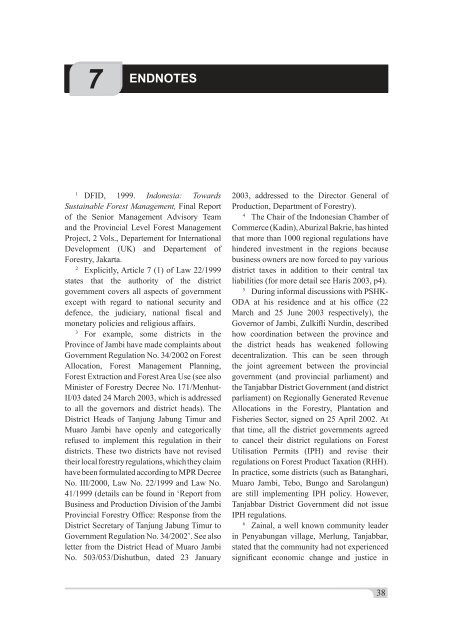Local policy-making mechanisms - Forest Climate Center
Local policy-making mechanisms - Forest Climate Center
Local policy-making mechanisms - Forest Climate Center
Create successful ePaper yourself
Turn your PDF publications into a flip-book with our unique Google optimized e-Paper software.
7ENDNOTES1DFID, 1999. Indonesia: TowardsSustainable <strong>Forest</strong> Management, Final Reportof the Senior Management Advisory Teamand the Provincial Level <strong>Forest</strong> ManagementProject, 2 Vols., Departement for InternationalDevelopment (UK) and Departement of<strong>Forest</strong>ry, Jakarta.2Explicitly, Article 7 (1) of Law 22/1999states that the authority of the districtgovernment covers all aspects of governmentexcept with regard to national security anddefence, the judiciary, national fiscal andmonetary policies and religious affairs.3For example, some districts in theProvince of Jambi have made complaints aboutGovernment Regulation No. 34/2002 on <strong>Forest</strong>Allocation, <strong>Forest</strong> Management Planning,<strong>Forest</strong> Extraction and <strong>Forest</strong> Area Use (see alsoMinister of <strong>Forest</strong>ry Decree No. 171/Menhut-II/03 dated 24 March 2003, which is addressedto all the governors and district heads). TheDistrict Heads of Tanjung Jabung Timur andMuaro Jambi have openly and categoricallyrefused to implement this regulation in theirdistricts. These two districts have not revisedtheir local forestry regulations, which they claimhave been formulated according to MPR DecreeNo. III/2000, Law No. 22/1999 and Law No.41/1999 (details can be found in ‘Report fromBusiness and Production Division of the JambiProvincial <strong>Forest</strong>ry Office: Response from theDistrict Secretary of Tanjung Jabung Timur toGovernment Regulation No. 34/2002’. See alsoletter from the District Head of Muaro JambiNo. 503/053/Dishutbun, dated 23 January2003, addressed to the Director General ofProduction, Department of <strong>Forest</strong>ry).4The Chair of the Indonesian Chamber ofCommerce (Kadin), Aburizal Bakrie, has hintedthat more than 1000 regional regulations havehindered investment in the regions becausebusiness owners are now forced to pay variousdistrict taxes in addition to their central taxliabilities (for more detail see Haris 2003, p4).5During informal discussions with PSHK-ODA at his residence and at his office (22March and 25 June 2003 respectively), theGovernor of Jambi, Zulkifli Nurdin, describedhow coordination between the province andthe district heads has weakened followingdecentralization. This can be seen throughthe joint agreement between the provincialgovernment (and provincial parliament) andthe Tanjabbar District Government (and districtparliament) on Regionally Generated RevenueAllocations in the <strong>Forest</strong>ry, Plantation andFisheries Sector, signed on 25 April 2002. Atthat time, all the district governments agreedto cancel their district regulations on <strong>Forest</strong>Utilisation Permits (IPH) and revise theirregulations on <strong>Forest</strong> Product Taxation (RHH).In practice, some districts (such as Batanghari,Muaro Jambi, Tebo, Bungo and Sarolangun)are still implementing IPH <strong>policy</strong>. However,Tanjabbar District Government did not issueIPH regulations.6Zainal, a well known community leaderin Penyabungan village, Merlung, Tanjabbar,stated that the community had not experiencedsignificant economic change and justice in38

















